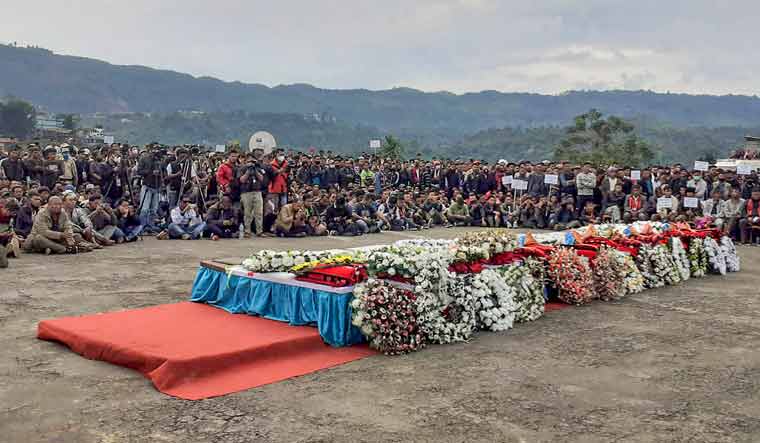''We want the army to leave Nagaland immediately. Our local police can handle law and order,'' Nyawang Konyak, the president of BJP's Mon district unit, told THE WEEK from Nagaland.
Nyawang claimed he was assaulted by army personnel after incessant violence broke out in the region following an army operation on December 5 that went horribly wrong. Fourteen civilians were killed in the firing.
Nyawang claimed he had witnessed the army firing on innocent civilians and trying to cover up the identities of the victims later.
The government is between a rock and a hard place as the public furore in Nagaland this time has the support of political forces as well as rebel groups.
Nagaland is home to the longest running insurgency in the country led by various factions of the NSCN. Given the history of violent militant activities, armed forces have been given the mandate to carry out counter insurgency operations under the protection of the Armed Forces Special Powers Act (AFSPA).
But, after the civilian deaths and FIR against 21 Para Special Forces of Army, the demand for withdrawal of the armed forces is growing both within and outside the state.
''I was there on the spot when the firing took place and the army-men hit me and my personal security officer. My sister's son was with me and he got injured,'' Nyawang said. The BJP leader said he had reported the incident to the Union Home Ministry and demanded that the army troops be pulled out from the state.
Nagaland enjoys special status under Article 371(A) which states that no Act passed by Parliament will be applicable to the state in respect of the religious or social practices of the Nagas, its customary law and procedure, administration of civil and criminal justice involving decisions related to Naga customary law, transfer and ownership of land and its resources. It can apply to Nagaland only after the state Assembly passes a resolution to do so.
Nyawang said Article 371(A) empowers the state to make its own decisions to protect its cultural identity and customary laws. “The state police is enough to protect the people. In the name of protection, if the army is killing innocents we don’t want them here,” he said.
A senior government official said any decision to withdraw the AFSPA or the armed forces deployed in Nagaland will be taken after consultations between the ministries of defence and home. The special investigation team will probe the incident while a home ministry team has also reached Kohima. Any decision will be taken after due deliberations at the highest level, the official said.
A security official in Nagaland said the government may want to do a balancing act that does not dip the morale of the security forces, including the special forces commandos, who were sent to carry out covert strikes against insurgents on the Indo-Myanmar border in the recent past.
But given the volatile situation, some drastic corrective steps need to be taken immediately.
The Naga National Political Groups, who have been one of the primary stakeholders in the ongoing Indo-Naga peace talks, have joined the people in condemning the military action.
The NSCN(K) and NSCN (IM) rebels have also warned that killing of innocent people will drive them away from a permanent peace settlement.
In a strongly worded statement, the NNPGs said, ''The AFSPA enforced in Nagaland in 1956 has always allowed cowards within the Indian military to take inhuman, disastrous decisions at critical political and historical moments.”
The NNPGs said the destructive Indian military tactics and actions in Naga homeland have belittled the political commitment of Indian prime minister and home minister.
In 2015, the Centre had inked the framework agreement with NSCN-IM, the largest insurgent group, which was supposed to become the basis for a permanent peace deal.
With no clear outcome of the talks in five years, the latest killing of civilians has widened the trust deficit.
Terming it a genocide committed by the Indian army, the NNPGs called upon national and international human rights organisations to raise their voice against the crimes committed by the army. The NNPGs also demanded a ''political solution'' to the Indo-Naga conflict and immediate revocation of all “draconian” laws.
Nyawang said as a BJP party functionary he has been travelling far and wide tapping the pulse of the Naga people.
“People don't care about NSCN or Indian army, they only want peace in Nagaland,” he said. ''Leave us alone to handle our state. We want to live peacefully.”





